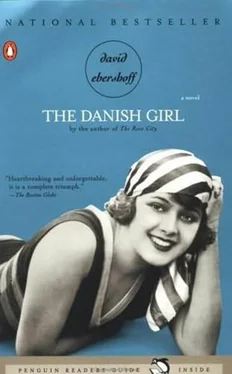“What if it doesn’t go as planned?” she asked.
“We’ll wait. I want to work with tissue from a young girl.”
“All of this is hard to believe,” Lili said. She wasn’t looking at Greta or Bolk. Her face was turned to the circle of girls, who were lying on their sides.
When Professor Bolk was gone, Lili shook her head. “I still can’t believe it,” she said, her eyes still on the girls. “He’s doing it, Greta. Just as you said he would. He’s turning me into a little girl.” Lili’s face was still, the tip of her nose red. She was whispering. “I think he might be a man capable of miracles.”
A breeze pushed Greta’s hair over her shoulder, and she looked to the shaded windows of Professor Bolk’s laboratory-the stucco walls, the glassed-in corridor connecting it to the rest of the clinic. It was off limits to her, but Greta imagined the tiered operating amphitheater and the steel ambulances cold to the touch and a shelf of jars filled with formaldehyde. One of the window shades was lifted, and for a minute Greta could see the silhouette of someone working in the laboratory, his head bent over his task; and then a second person-all black shadow-drew the shade again, and the stucco building was yellow in the sunlight and as lifeless as before.
“So,” she said. “Tomorrow it is,” and she lowered Lili’s head into her lap, and they closed their eyes and received the weak heat of the sun. They listened to the muted squeals of the girls on the lawn, and the far-away splash of a paddlewheel on the Elbe. Greta thought of Teddy Cross, whom she had also once thought of as capable of miracles. There was that time with Carlisle’s leg. Greta and Teddy had been married only a few months, and they were living in the Spanish house in Bakersfield, and the first hot winds were beginning to blow through the eucalyptus groves.
Greta was pregnant with baby Carlisle and sick on the sofa from Gump’s. One day Carlisle drove over the Ridge Route in his yellow- fendered Detroiter to visit them and to investigate potential oilfields.
The strawberry fields were a carpet of green that spring, edged by the buttery gold of the poppies in the foothills. Men from Los Angeles and San Francisco had begun descending on Bakersfield as word got out that there might be oil beneath the land. The farmer to the south of Teddy Cross’s parents had sunk a well with his hoe-ax and struck oil. Teddy was sure his parents could hit oil too, and Greta secretly wondered if Teddy felt the need to become rich in a strange effort to match her. In the late afternoons, after tending to Greta, he would drive out the rutted road to the Cross land and drill in the long shadow of an old oak. He used a tool with a gyre blade that could be extended with attachments; and with the sun glinting off the silvery underside of the strawberry leaves, Teddy would grind the drill through the loam.
And then Carlisle drove into Bakersfield. He was still lame then, on a pair of hand-cast crutches that came to his elbows, their grooved handles made of carved ivory. He had a second pair cast in sterling silver, which Mrs. Waud requested him to use on formal occasions. On his first night at the Spanish house, while Greta was sleeping, she would later learn, Teddy drove Carlisle out to the Cross land and showed him his well. “I’m worried about disappointing them,” Teddy said of his parents, who were huddled in their little house, the wall planks separated with gaps wide enough for the wind. The hole in the ground was about as wide around as a thigh and surrounded by a wood platform. Teddy pulled up a sample of dirt with a cup attached to the rope. They examined it, the mouths of both young men open. Teddy looked to Carlisle, as if he expected him, just because he was up at Stanford, to be able to discern something from the cup of black soil. “Do you think there’s oil down there?” Teddy asked.
Looking over to the knotted oak at the edge of the strawberry field and then up to the purpling sky, Carlisle said, “I’m not really sure.”
They were out there a half hour, standing in the sunset, as the wind kicked up the dust and hurled it at their ankles. The bowl of the sky was dimming, and the stars were beginning to glitter. “Let’s get going,” Teddy said, and Carlisle, who never once blamed Teddy Cross for all that had happened to Greta, said, “All right.”
Teddy moved to the truck, and Carlisle followed, except the cap of his crutch caught between the boards of the platform, and the next thing he knew his leg, the bad one, slipped down the well like a snake. He would have laughed at how quickly he found himself splayed on the platform, except that his leg had come back to life with pain. Teddy heard his cry and ran back to the dry well, saying, “Are you okay? Can you get up?”
Carlisle couldn’t get up, his leg jammed into the hole. Teddy began to peel away the planks with a crowbar, the boards coming loose with a creak that howled across the fields. The coyotes in the foothills were howling too, and the still black of the Bakersfield night was brought to life with Carlisle crying softly into his own shoulder. An hour passed before he was pried free, exposing the leg broken in the shin. There was no blood, but the skin was turning darker than a plum. Teddy helped Carlisle into the truck, and then drove him west through the night, across the width of the valley, the fields changing from strawberry to red leaf lettuce to vineyards and finally to pecan orchards, and then over the mountains and into Santa Barbara. It was nearly midnight when a doctor with a monocle set Carlisle’s leg, while a night nurse with a rusty red bob dipped strips of gauze into a tub of plaster. Then, much later, almost at dawn, Teddy and Carlisle pulled into the bamboo-shaded drive of the Spanish house. They were exhausted and, finally, home.
Greta was still sleeping. “Asleep since you left,” said Akiko, whose eyes were as black as the bruised skin on Carlisle’s shin. And when Greta woke, she was too drowsy with nausea to notice the plaster cast on Carlisle’s leg; the cast was so chalky that it left little patches of dust wherever Carlisle dragged it. The dust Greta noticed, wondering with half-interest-as she always did with housework-where it had come from, swiping it from the cushion of the ottoman. She knew Carlisle had been injured, but it hardly registered with her at all. “Oh, I’m fine,” Carlisle reported, and Greta left it at that, because the only way to describe how she felt was as if she had been poisoned. She looked at the cast and rolled her eyes back into her head. And when the summer descended and the mercury in the thermometers capped out at 110 degrees and Greta finally gave birth, the cast was sawed off Carlisle’s leg. The baby was dead, but Carlisle’s leg was healthier than it had ever been since that day when Greta and he were six. There was still a bit of a drag in the foot, but Carlisle no longer needed the crutches, and he could stride right into the Spanish house’s step-down living room without holding the rail.
“The only good thing to come of Bakersfield,” Greta would sometimes say.
Then, for the rest of their marriage, she thought of Teddy Cross as a man capable of miracles-once, when she saw his lips pressed together in concentration, it seemed to Greta that he could do anything at all. But when Lili said the same of Professor Bolk, Greta looked down to the Elbe and counted the boats and then counted the girls on the lawn, and said, “We will see.”

Lili woke herself up screaming. She didn’t know how long she’d been sleeping, but she could feel the cap of morphine laced across her brain, her eyelids too heavy to lift.
Читать дальше













